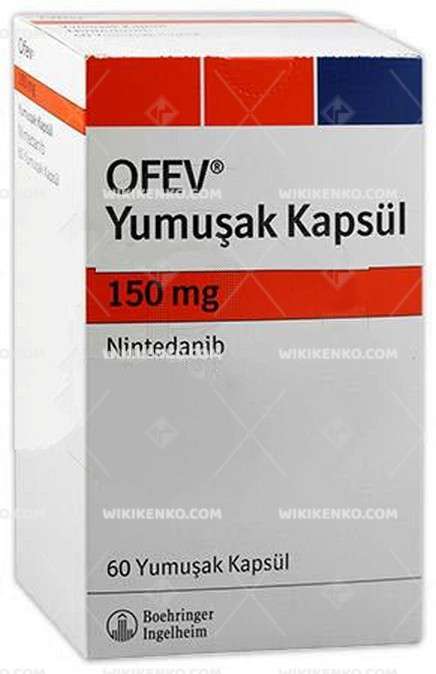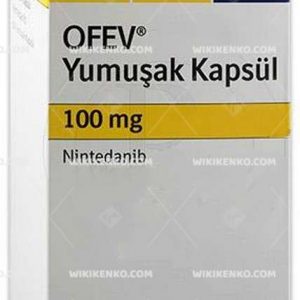Ofev Soft Capsule 150 Mg
Ofev Soft Capsule 150 Mg is a medication used to treat specific lung conditions. In this article, we delve into the details of Ofev, its uses, dosage, and potential risks.
| Dosage form | |
|---|---|
| Pack size | |
| Potency | 150 Mg |
| Manufacturer | |
| Origin | |
| Generic Name (Ingredient) | Each Capsule Contains 150 Mg Of Nintedanib (In Esylate Form). |
Assuming your emergency circumstances for this product, visit Urgent Quotation page. Besides, for any pharmaceutical questions, please ask us in the comments section.
Description
Ofev Soft Capsule contains the active substance nintedanib, which belongs to the class of tyrosine kinase inhibitors. It is primarily used to treat the following conditions in adults:
Idiopathic Pulmonary Fibrosis (IPF)
A disease characterized by thickening, stiffness, and scarring of lung tissue over time. IPF impairs oxygen transport, making breathing difficult.
Systemic Sclerosis-Associated Interstitial Lung Disease (SSc-ILD)
A rare autoimmune disease affecting connective tissue in various body parts. SSc-ILD leads to fibrosis (scarring) of the lungs, reducing oxygen transport.
Other Chronic Fibrosing Interstitial Lung Diseases (ILDs)
These progressive conditions involve thickening and scarring of lung tissue, leading to impaired lung function.
How Does Ofev Work?
Nintedanib, the active ingredient in Ofev, is a tyrosine kinase inhibitor. It helps reduce further scarring and stiffness in the lungs by targeting specific signaling pathways involved in fibrosis.
Dosage and Administration
- The recommended dose is one 150 mg capsule twice daily (total of 300 mg daily).
- Take the capsules approximately 12 hours apart, ideally with food.
- Swallow the capsules whole with water; do not chew or crush them.
Potential Risks and Precautions
- Cardiovascular Risk: Caution is advised when treating patients at higher cardiovascular risk, including those with known coronary artery disease.
- Pulmonary Hypertension: Nintedanib should not be used in patients with severe pulmonary hypertension.
- Tolerance and Dose Adjustment: If patients do not tolerate the 150 mg dose, consider reducing to 100 mg twice daily or interrupting treatment.
Product Details
- Capsule Appearance: Ofev 150 mg soft capsules are brown, opaque, oblong soft-gelatin capsules imprinted with the Boehringer Ingelheim company logo and the number “150” in black.
- Pack Size: Each pack contains 60 × 1 soft capsules in perforated aluminum/aluminum end-dose blister packs.
Common Side Effects of Ofev Soft Capsule
While taking Ofev, some serious and other side effects may occur. Let’s explore them in detail:
Serious Side Effects
| Side Effect | Incidence |
|---|---|
| Dark urine | – |
| Diarrhea | – |
| Loss of appetite | – |
| Nausea | – |
| Pain or tenderness in the upper stomach | – |
| Pale stools | – |
| Severe stomach pain | – |
| Vomiting | – |
| Yellow eyes or skin | – |
Other Side Effects
| Side Effect | Incidence |
|---|---|
| Weight loss | – |
| Depression | – |
| Dry skin and hair | – |
| Feeling cold | – |
| Hair loss | – |
| Hoarseness or husky voice | – |
| Muscle cramps and stiffness | – |
| Slow heartbeat | – |
| Unusual tiredness or weakness | – |
Precautions to Follow While Taking Ofev
- Hepatic Impairment:
- Ofev is not recommended for patients with moderate (Child Pugh B) or severe (Child Pugh C) hepatic impairment.
- Patients with mild hepatic impairment (Child Pugh A) can be treated with a reduced dosage of 100 mg twice daily.
- Dosage and Administration:
- Take Ofev with food, approximately 12 hours apart.
- Swallow the Ofev capsules whole with liquid; do not chew, crush, or open them.
- If you accidentally come in contact with the content of the capsule, wash your hands immediately.
- If you miss a dose, resume at the next scheduled time without making up for the missed dose.
- Do not exceed the recommended maximum daily dosage of 300 mg.
- Other Precautions:
- Conduct liver function tests (ALT, AST, and bilirubin) before starting Ofev, during the first 3 months of treatment, and periodically thereafter.
- Perform a pregnancy test in females of reproductive potential before initiating Ofev and during treatment as appropriate.
Conclusion
Ofev Soft Capsule 150 Mg is a medication used to treat specific lung conditions, including Idiopathic Pulmonary Fibrosis (IPF), Systemic Sclerosis-Associated Interstitial Lung Disease (SSc-ILD), and other chronic fibrosing Interstitial Lung Diseases (ILDs). By understanding its mechanism of action, dosage, safety considerations, and potential side effects, patients and healthcare providers can make informed decisions about its use. As with any medication, it is crucial to consult with a qualified healthcare professional for personalized guidance and monitoring.
1 review for Ofev Soft Capsule 150 Mg
Use the form below to report an error
Please answer the questions as thoroughly and accurately as possible. Your answers will help us better understand what kind of mistakes happen, why and where they happen, and in the end the purpose is to build a better archive to guide researchers and professionals around the world.
The information on this page is not intended to be a substitute for professional medical advice, diagnosis, or treatment. always seek the advice for your physician or another qualified health provider with any questions you may have regarding a medical condition. Always remember to
- Ask your own doctor for medical advice.
- Names, brands, and dosage may differ between countries.
- When not feeling well, or experiencing side effects always contact your own doctor.
Cyberchondria
The truth is that when we’re sick, or worried about getting sick, the internet won’t help.
According to Wikipedia, cyberchondria is a mental disorder consisting in the desire to independently make a diagnosis based on the symptoms of diseases described on Internet sites.
Why you can't look for symptoms on the Internet
If diagnoses could be made simply from a textbook or an article on a website, we would all be doctors and treat ourselves. Nothing can replace the experience and knowledge of specially trained people. As in any field, in medicine there are unscrupulous specialists, differences of opinion, inaccurate diagnoses and incorrect test results.




Maniza –
Hi I want to know about medication Ofev 150mg
Medical Guidance Center –
Hello Maniza, this is WikiKenko,
Ofev is a medication that contains the active ingredient nintedanib. It is used to treat diseases that cause scar tissue (fibrosis) to form deep within the lungs. Ofev is used to treat a lung disease called idiopathic pulmonary fibrosis (IPF) and is also used to treat chronic interstitial lung disease in which the scar tissue keeps getting worse. Additionally, it is used to slow the decline in lung function in people with a disorder called systemic sclerosis-associated interstitial lung disease (sometimes called scleroderma-associated ILD).
It is important to note that Ofev can cause birth defects or death in an unborn baby. Women of childbearing age should avoid getting pregnant while using this medicine and for at least 3 months after their last dose. They should use effective birth control, with an extra barrier method (condom, diaphragm, cervical cap, contraceptive sponge).
Before taking this medicine, you should tell your doctor if you have ever had liver disease; heart problems; a blood clot; bleeding problems; surgery on your stomach or intestines; diverticulitis; if you smoke; or if you take a blood thinner such as warfarin.
Some common side effects of Ofev include nausea, vomiting, abdominal pain, headache, reduced appetite, weight loss, high blood pressure, back pain, diarrhea, hair loss and fatigue 2. If you experience any side effects that are concerning or bothersome, you should talk with your doctor or pharmacist.
Would you like to inquire about anything else?